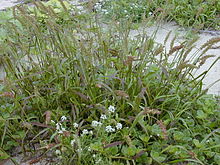Cenchrus echinatus is a species of grass known by the common names southern sandbur,[3] spiny sandbur,[4] southern sandspur, and in Australia, Mossman River grass.[5][6] It is native to North and South America. It is a clump-forming annual grass growing up to 80 cm (31 in) tall. The leaves occur with or without hairs and measure up to 12 mm (0.47 in) wide. The ligule is a fringe of hairs. The grass has barbed burrs of 4–10 mm (0.16–0.39 in) long.
| Cenchrus echinatus | |
|---|---|

| |
| On Kure Atoll | |
| Scientific classification | |
| Kingdom: | Plantae |
| Clade: | Tracheophytes |
| Clade: | Angiosperms |
| Clade: | Monocots |
| Clade: | Commelinids |
| Order: | Poales |
| Family: | Poaceae |
| Subfamily: | Panicoideae |
| Genus: | Cenchrus |
| Species: | C. echinatus
|
| Binomial name | |
| Cenchrus echinatus | |
| Synonyms[2] | |
| |
In Australia it forms an invasive weed in coastal situations.[6]
Ecology edit
The species is invasive in New Caledonia,[7] Tahiti, and Rarotonga.[8]
Gallery edit
-
In Brazil
-
In the Florida Keys
References edit
- ^ Bárrios, S. & Copeland, A. (2021). "Cenchrus echinatus". IUCN Red List of Threatened Species. 2021: e.T13506981A192150221. Retrieved 24 November 2023.
- ^ a b "Cenchrus echinatus". Plants of the World Online. Royal Botanic Gardens, Kew. Retrieved 25 November 2023.
- ^ USDA, NRCS (n.d.). "Cenchrus echinatus". The PLANTS Database (plants.usda.gov). Greensboro, North Carolina: National Plant Data Team. Retrieved 13 January 2016.
- ^ BSBI List 2007 (xls). Botanical Society of Britain and Ireland. Archived from the original (xls) on 2015-06-26. Retrieved 2014-10-17.
- ^ "University of Florida IFAS Extension Southern Sandspur (Southern Sandbur), Cenchrus echinatus L." Archived from the original on 2008-06-20. Retrieved 2008-06-15.
- ^ a b Cenchrus echinatus. Archived September 18, 2009, at the Wayback Machine National Weeds Strategy.
- ^ Hequet, Vanessa (2009). LES ESPÈCES EXOTIQUES ENVAHISSANTES DE NOUVELLE-CALÉDONIE (PDF) (in French). p. 17.
- ^ "Piri-Piri ~ Piripiri". Te Māra Reo: The Language Garden. Benton Family Trust. 2022. Retrieved 29 November 2022.
